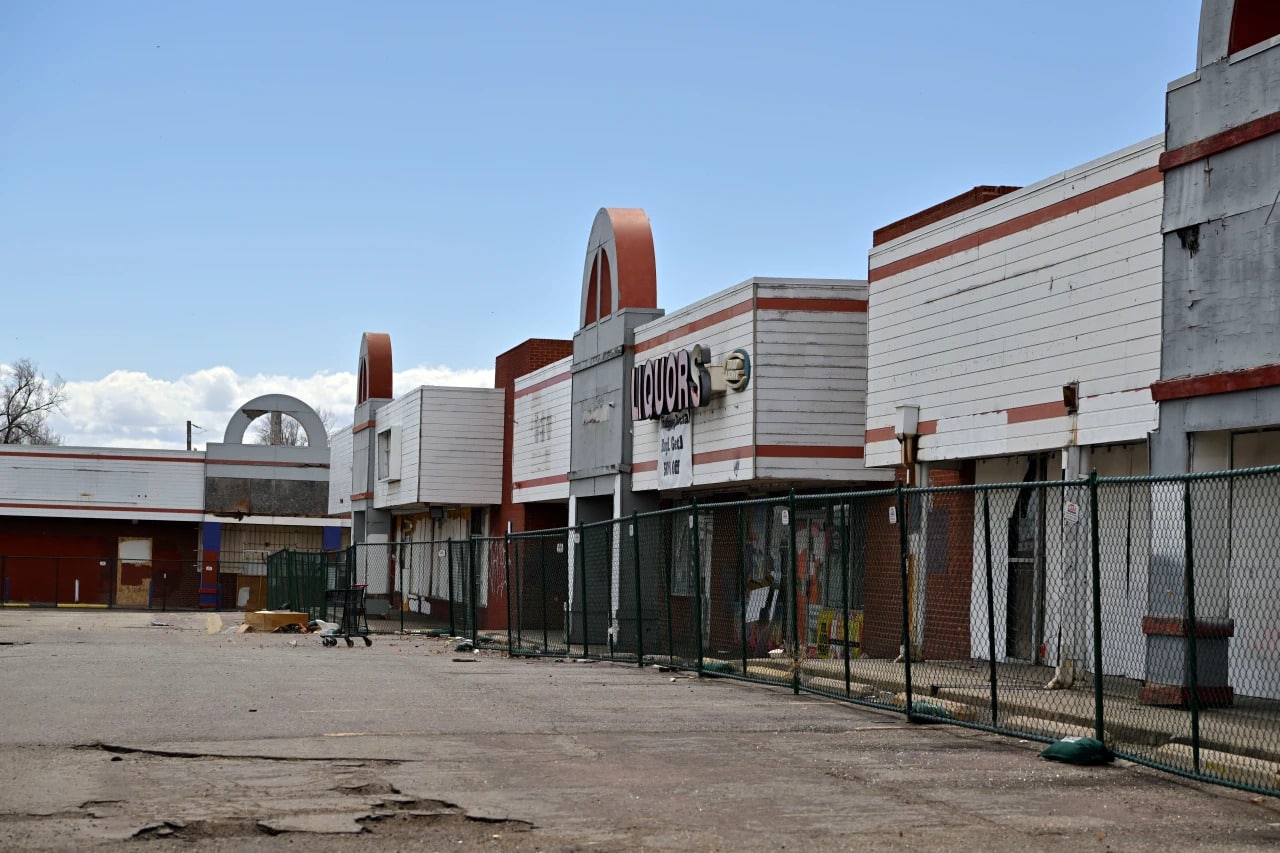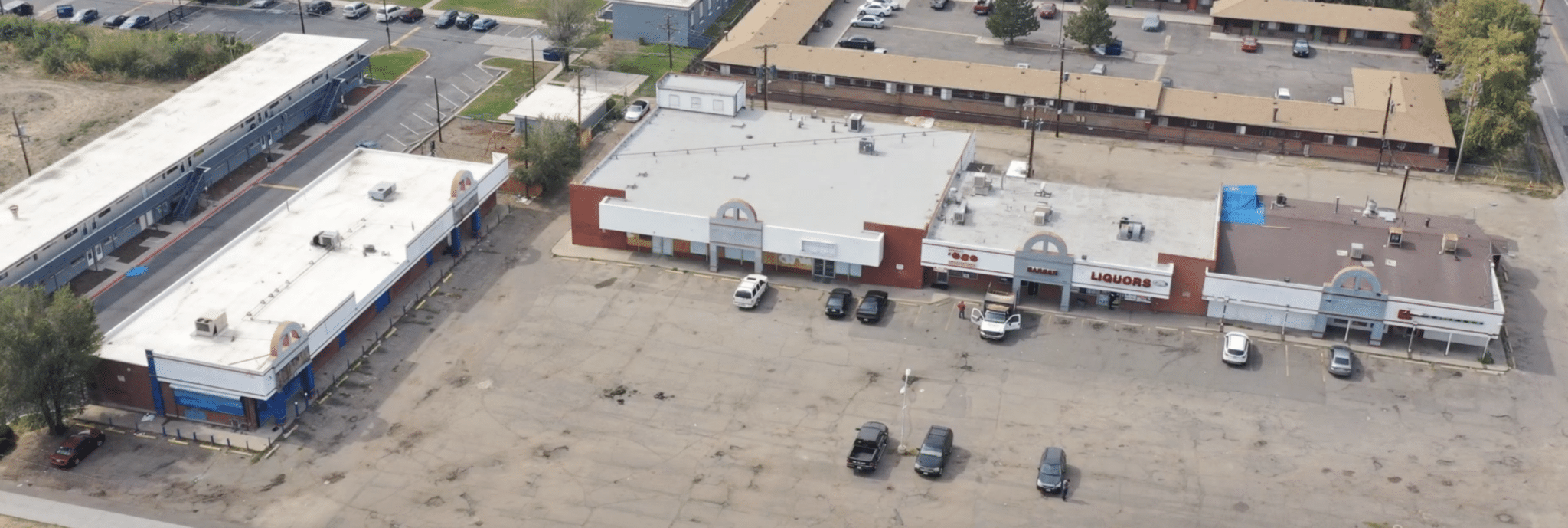
The vacant Holiday Shops shopping center at W. 10th Ave. and Sheridan Boulevard on Friday, March 31, 2023, in Lakewood. (Eric Lutzens/The Denver Post)
Traditionally, developers and cities celebrate the groundbreaking of a new development, or the last beam placed atop a new build.
But later this month, Lakewood will celebrate destruction.
On July 25, the city and Denver-based developers TOD Properties and Trailbreak Partners are hosting a ceremony to mark the demolition of the run-down retail center at 955 Sheridan Blvd.
“This center has been one of the biggest examples of troubled properties that we’re trying to tackle,” Lakewood Planning Director Travis Parker said. “It’s been mostly vacant for a long time. It’s been an attractive area for the homeless and other crimes.”
The corner property has been an eyesore at the edge of Denver and Lakewood for years, and a magnet for vandalism and theft, Lakewood Economic Development Director Robert Smith said. It’s been largely vacant since at least 2007, although a Mexican restaurant, barbershop and liquor store held on for a while.
The last tenants, however, vacated earlier this year. Now under new ownership, the property is benefitting from a new city program intended to address run-down properties.

The run-down shopping center at the corner of 10th and Sheridan consists of two building. (Courtesy City of Lakewood)
The center’s decline came under the watch of California-based owners, who paid $885,000 for it in 1998, records show. Trailbreak Director of Development Dave Bacon said that, until recently, the owners weren’t interested in selling.
“Trailbreak Partners had its eye on this site for quite some time, but for one reason or another we were not successful in striking a deal,” Bacon said.
Bacon said another group was eventually able to reach an agreement with the California owners and then assigned the rights and sale to Trailbreak in 2021. The apartment developers secured the 2.5-acre site for $7.3 million, records show.
Trailbreak intends to develop a 362-unit apartment complex as part of a joint venture with TOD, the firms said. The companies have partnered on Lakewood projects in the past, such as the nearby West Line Village Townhomes and Traverse Apartments.
If all goes to plan, the companies hope to finish construction in 2026. But first, the shuttered shopping center needs to go.
Dilapidated and vacant buildings can be addressed in three ways through Lakewood’s new “distressed properties program.” The city can purchase the property and clean it up for resale, owners can submit plans for redevelopment or developers can receive money for demolition through a revolving loan fund.
Parker said the shopping center is the pilot property for the revolving loan fund. Smith said the developers received $676,218 to demolish the retail center.
The loan will be paid back when the developers receive funding or permits for their planned project. The latest it can be paid back is September 30, 2026.
“The loan is temporary … it’s a lien on the property, not based on the developer, so if they go belly up, we still get paid back,” Smith said.
Smith said developers typically don’t undertake demolition until their permits and plans are approved and they’re ready to break ground — which can take years. The city’s support helps move the demolition date up.
“The goal behind this program is to bring those buildings down,” Smith said. “They’re not going to be adaptively reused – nobody wants to reuse them.”
Even if the apartment building doesn’t break ground, Smith said, Lakewood will still have scored a win — because the shopping center will be gone.
“Vacant buildings are challenging,” he said. “They’re a nightmare for bad things to happen. But vacant (undeveloped) properties are much more manageable.”

The vacant Holiday Shops shopping center at W. 10th Ave. and Sheridan Boulevard on Friday, March 31, 2023, in Lakewood. (Eric Lutzens/The Denver Post)
Traditionally, developers and cities celebrate the groundbreaking of a new development, or the last beam placed atop a new build.
But later this month, Lakewood will celebrate destruction.
On July 25, the city and Denver-based developers TOD Properties and Trailbreak Partners are hosting a ceremony to mark the demolition of the run-down retail center at 955 Sheridan Blvd.
“This center has been one of the biggest examples of troubled properties that we’re trying to tackle,” Lakewood Planning Director Travis Parker said. “It’s been mostly vacant for a long time. It’s been an attractive area for the homeless and other crimes.”
The corner property has been an eyesore at the edge of Denver and Lakewood for years, and a magnet for vandalism and theft, Lakewood Economic Development Director Robert Smith said. It’s been largely vacant since at least 2007, although a Mexican restaurant, barbershop and liquor store held on for a while.
The last tenants, however, vacated earlier this year. Now under new ownership, the property is benefitting from a new city program intended to address run-down properties.

The run-down shopping center at the corner of 10th and Sheridan consists of two building. (Courtesy City of Lakewood)
The center’s decline came under the watch of California-based owners, who paid $885,000 for it in 1998, records show. Trailbreak Director of Development Dave Bacon said that, until recently, the owners weren’t interested in selling.
“Trailbreak Partners had its eye on this site for quite some time, but for one reason or another we were not successful in striking a deal,” Bacon said.
Bacon said another group was eventually able to reach an agreement with the California owners and then assigned the rights and sale to Trailbreak in 2021. The apartment developers secured the 2.5-acre site for $7.3 million, records show.
Trailbreak intends to develop a 362-unit apartment complex as part of a joint venture with TOD, the firms said. The companies have partnered on Lakewood projects in the past, such as the nearby West Line Village Townhomes and Traverse Apartments.
If all goes to plan, the companies hope to finish construction in 2026. But first, the shuttered shopping center needs to go.
Dilapidated and vacant buildings can be addressed in three ways through Lakewood’s new “distressed properties program.” The city can purchase the property and clean it up for resale, owners can submit plans for redevelopment or developers can receive money for demolition through a revolving loan fund.
Parker said the shopping center is the pilot property for the revolving loan fund. Smith said the developers received $676,218 to demolish the retail center.
The loan will be paid back when the developers receive funding or permits for their planned project. The latest it can be paid back is September 30, 2026.
“The loan is temporary … it’s a lien on the property, not based on the developer, so if they go belly up, we still get paid back,” Smith said.
Smith said developers typically don’t undertake demolition until their permits and plans are approved and they’re ready to break ground — which can take years. The city’s support helps move the demolition date up.
“The goal behind this program is to bring those buildings down,” Smith said. “They’re not going to be adaptively reused – nobody wants to reuse them.”
Even if the apartment building doesn’t break ground, Smith said, Lakewood will still have scored a win — because the shopping center will be gone.
“Vacant buildings are challenging,” he said. “They’re a nightmare for bad things to happen. But vacant (undeveloped) properties are much more manageable.”
